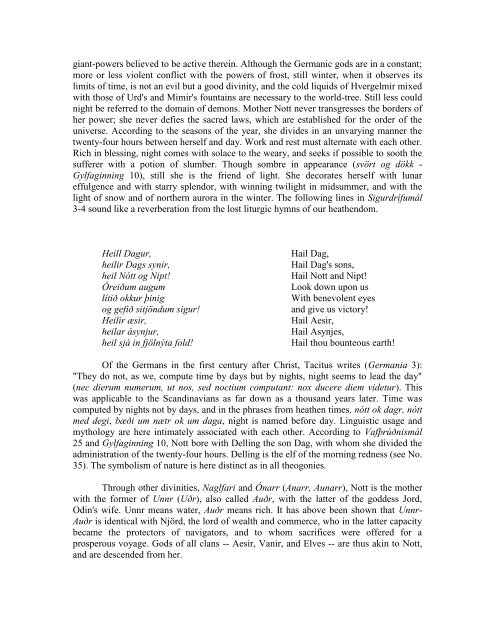Chapters 44-95 - Germanic Mythology
Chapters 44-95 - Germanic Mythology
Chapters 44-95 - Germanic Mythology
Create successful ePaper yourself
Turn your PDF publications into a flip-book with our unique Google optimized e-Paper software.
giant-powers believed to be active therein. Although the <strong>Germanic</strong> gods are in a constant;<br />
more or less violent conflict with the powers of frost, still winter, when it observes its<br />
limits of time, is not an evil but a good divinity, and the cold liquids of Hvergelmir mixed<br />
with those of Urd's and Mimir's fountains are necessary to the world-tree. Still less could<br />
night be referred to the domain of demons. Mother Nott never transgresses the borders of<br />
her power; she never defies the sacred laws, which are established for the order of the<br />
universe. According to the seasons of the year, she divides in an unvarying manner the<br />
twenty-four hours between herself and day. Work and rest must alternate with each other.<br />
Rich in blessing, night comes with solace to the weary, and seeks if possible to sooth the<br />
sufferer with a potion of slumber. Though sombre in appearance (svört og dökk -<br />
Gylfaginning 10), still she is the friend of light. She decorates herself with lunar<br />
effulgence and with starry splendor, with winning twilight in midsummer, and with the<br />
light of snow and of northern aurora in the winter. The following lines in Sigurdrífumál<br />
3-4 sound like a reverberation from the lost liturgic hymns of our heathendom.<br />
Heill Dagur,<br />
heilir Dags synir,<br />
heil Nótt og Nipt!<br />
Óreiðum augum<br />
lítið okkur þinig<br />
og gefið sitjöndum sigur!<br />
Heilir æsir,<br />
heilar ásynjur,<br />
heil sjá in fjölnýta fold!<br />
Hail Dag,<br />
Hail Dag's sons,<br />
Hail Nott and Nipt!<br />
Look down upon us<br />
With benevolent eyes<br />
and give us victory!<br />
Hail Aesir,<br />
Hail Asynjes,<br />
Hail thou bounteous earth!<br />
Of the Germans in the first century after Christ, Tacitus writes (Germania 3):<br />
"They do not, as we, compute time by days but by nights, night seems to lead the day"<br />
(nec dierum numerum, ut nos, sed noctium computant: nox ducere diem videtur). This<br />
was applicable to the Scandinavians as far down as a thousand years later. Time was<br />
computed by nights not by days, and in the phrases from heathen times, nótt ok dagr, nótt<br />
med degi, bæði um nætr ok um daga, night is named before day. Linguistic usage and<br />
mythology are here intimately associated with each other. According to Vafþrúðnismál<br />
25 and Gylfaginning 10, Nott bore with Delling the son Dag, with whom she divided the<br />
administration of the twenty-four hours. Delling is the elf of the morning redness (see No.<br />
35). The symbolism of nature is here distinct as in all theogonies.<br />
Through other divinities, Naglfari and Ónarr (Anarr, Aunarr), Nott is the mother<br />
with the former of Unnr (Uðr), also called Auðr, with the latter of the goddess Jord,<br />
Odin's wife. Unnr means water, Auðr means rich. It has above been shown that Unnr-<br />
Auðr is identical with Njörd, the lord of wealth and commerce, who in the latter capacity<br />
became the protectors of navigators, and to whom sacrifices were offered for a<br />
prosperous voyage. Gods of all clans -- Aesir, Vanir, and Elves -- are thus akin to Nott,<br />
and are descended from her.
















